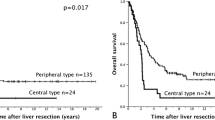Abstract
The purpose of this study was to compare the treatment and outcome in patients referred for staged re section of synchronous colorectal liver metastases. The records of patients who had undergone colon or rectal resection and were then referred for evaluation of clinically resectable synchronous liver metastases between January 1995 and January 2000 were reviewed. Comparisons were made between patients who did not receive neoadjuvant chemotherapy and had exploratory operations after recovery from colon re section and patients who did receive chemotherapy before liver resection. A total of 106 patients were treated during the 5-year period. Neoadjuvant chemotherapy was given to 52 of the patients; in 29 of them the disease did not progress, but in 17 patients the disease progressed while they were receiving treatment. Median follow-up was 30 months. Patient- and tumor-related variables were similar between groups. Five-year survival was statistically similar between patients who did and those who did not receive neoadjuvant chemotherapy (43% vs. 35%, P = 0.49). Patients within the neoadjuvant group whose dis ease did not progress while they were receiving chemotherapy experienced significantly improved sur vival as compared to patients who did not receive chemotherapy (85% vs. 35%, P = 0.03). In the setting of synchronous colorectal liver metastases, the response to neoadjuvant chemotherapy may be a prognos tic indicator of survival and may assist in the selection of patients for conventional or experimental adju vant therapies.
Similar content being viewed by others
References
Scheele J, Stang R, Altendorf-Hofmann A, Paul M. Resection of colorectal liver metastases. World J Surg 1995; 19:59–71.
Iwatsuki S, Dvorchik I, Madariaga JR, et al. Hepatic resection for metastatic colorectal adenocarcinoma: A proposal of a prognostic scoring system. J Am Coll Surg 1999; 189:291–299.
Gayowski TJ, Iwatsuki S, Madariaga JR, et al. Experience in hepatic resection for metastatic colorectal cancer: Analysis of clinical and pathologic risk factors. Surgery 1994; 116:703–710.
Fong Y, Fortner J, Sun RL, et al. Clinical score for predicting recurrence after hepatic resection for metastatic colorectal cancer: Analysis of 1001 consecutive cases. Ann Surg 1999;230:309–318.
Cady B, Stone MD, McDermott WV Jr, et al. Technical and biological factors in disease-free survival after hepatic resection for colorectal cancer metastases. Arch Surg 1992; 127:561–568.
Martin R, Paty P, Fong Y, et al. Synchronous colorectal liver metastases: Simultaneous versus staged resection?
Sugawara Y, Yamamoto J, Yamasaki S, et al. Estimating the prognosis of hepatic resection in patients with metastatic liver tumors from colorectal cancer with special concern for the timing of hepatectomy. Surgery 2001;129:408–413.
Fujita S, Akasu T, Moriya Y. Resection of synchronous liver metastases from colorectal cancer. Jpn J Clin Oncol 2000; 30:7–11.
Schlag P, Hohenberger P, Herfarth C. Resection of liver metastases in colorectal cancer—Competitive analysis of treatment results in synchronous versus metachronous metastases. Eur J Surg Oncol 1990;16:360–365.
Silen W. Hepatic resection for metastases from colorectal carcinoma is of dubious value. Arch Surg 1989;124:1021–1022.
Lyass S, Zamir G, Matot I, et al. Combined colon and hepatic resection for synchronous colorectal liver metastases. J Surg Oncol 2001;78:17–21.
Jatzko G, Wette V, Muller M, et al. Simultaneous resection of colorectal carcinoma and synchronous liver metastases in a district hospital. Int J Colorectal Dis 1991;6:111–114.
Doko M, Zovak M, Ledinsky M, et al. Safety of simultaneous resections of colorectal cancer and liver metastases. Coll Antropol 2000;24:381–390.
Eilber FC, Rosen G, Eckardt J, et al. Treatment-induced pathologic necrosis: A predictor of local recurrence and survival in patients receiving neoadjuvant therapy for highgrade extremity soft tissue sarcomas. J Clin Oncol 2001;19:3203–3209.
Chollet P, Amat S, Cure H, et al. Prognostic significance of a complete pathological response after induction chemotherapy in operable breast cancer. Br J Cancer 2002;86:1041–1046.
Tabira Y, Yasunaga M, Sakaguchi T, et al. Predicting initial recurrence pattern of esophageal cancer after neoadjuvant chemotherapy. Hepatogastroenterology 2000;47:1315–1318.
Shankar A, Leonard P, Renaut AJ, et al. Neo-adjuvant therapy improves resectability rates for colorectal liver metastases. Ann R Coll Surg Engl 2001;83:85–88.
Bismuth H, Adam R, Levi F, et al. Resection of nonresectable liver metastases from colorectal cancer after neoadjuvant chemotherapy. Ann Surg 1996;224:509–520.
Bathe OF, Franceschi D, Livingstone AS, et al. Increased thymidylate synthase gene expression in liver metastases from colorectal carcinoma: Implications for chemotherapeutic options and survival. Cancer J Sci Am 1999;5:34–40.
Banerjee D, Gorlick R, Liefshitz A, et al. Levels of E2F-1 expression are higher in lung metastasis of colon cancer as compared with hepatic metastasis and correlate with levels of thymidylate synthase. Cancer Res 2000;60:2365–2367.
Author information
Authors and Affiliations
Corresponding author
Rights and permissions
About this article
Cite this article
Allen, P.J., Kemeny, N., Jarnagin, W. et al. Importance of response to neoadjuvant chemotherapy in patients undergoing resection of synchronous colorectal liver metastases. J Gastrointest Surg 7, 109–117 (2003). https://doi.org/10.1016/S1091-255X(02)00121-X
Published:
Issue Date:
DOI: https://doi.org/10.1016/S1091-255X(02)00121-X




